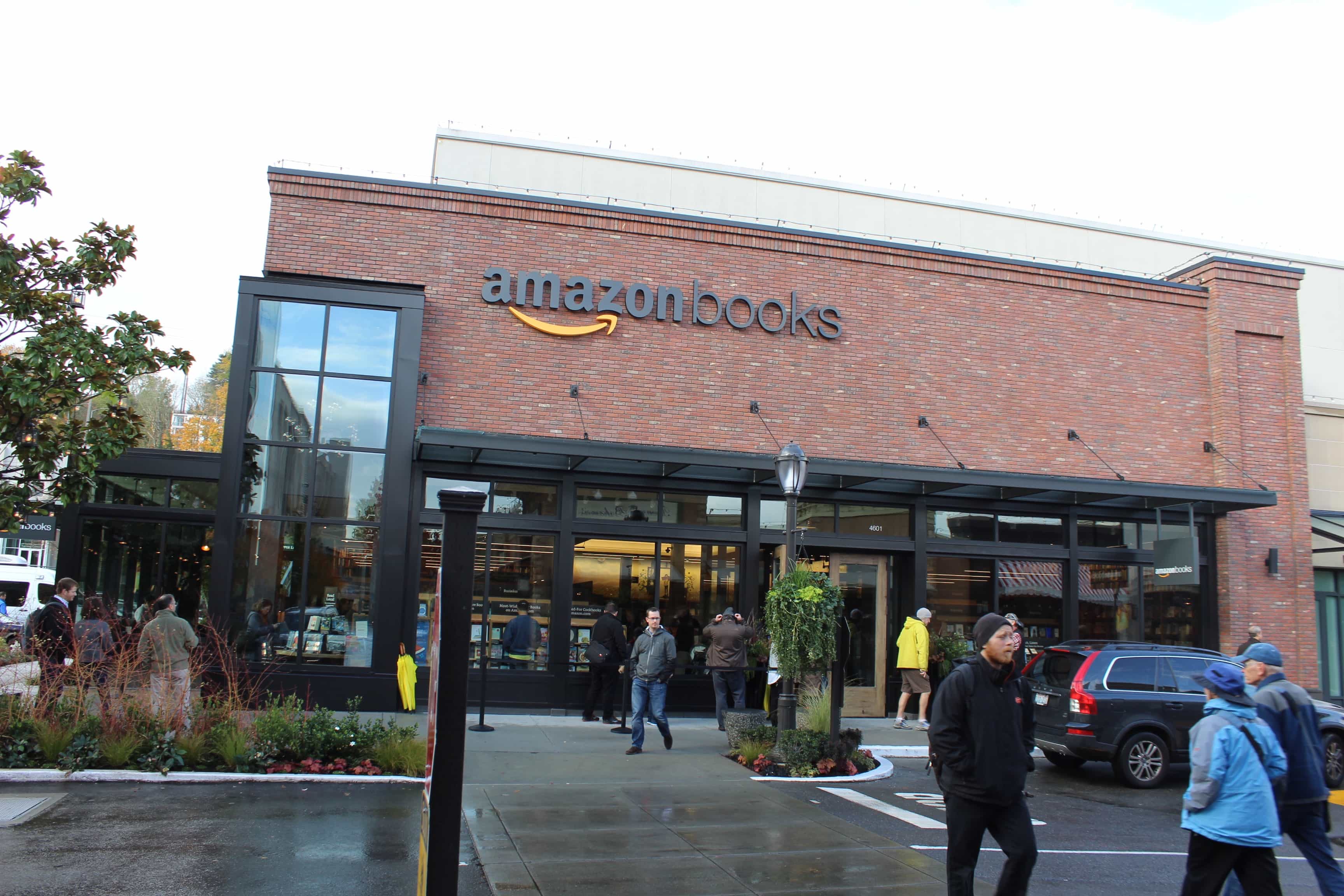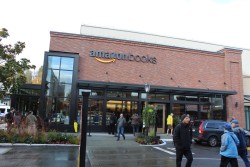Amazon Books, Antitrust Law, ETC


Finally, I don’t want to close this month’s letter without noting one thing regarding a notable news item in our industry. As I know you’ve read, Amazon.com has opened a brick-and-mortar bookstore in Seattle. While it is far too soon to speculate about the company’s intentions or goals regarding its storefront profile, I did want to make one thing clear: ABA member bookstores can rest assured that your trade association will continue to remind publishers and other vendors about their obligations under antitrust laws, especially regarding their need to ensure that inventory purchased under one set of terms is not commingled and transferred to another class of business.
If you are unsure of what that means, you’re not alone. It took me a fair amount of Googling before I realized that this was an oblique reference to the Robinson-Patman Act, a part of antitrust law that covers price discrimination between wholesalers, retailers, and competitors.
You can read more about it at the FTC, and at Wikipedia.
Or, you could read the spin that Publishers Weekly's Judith Rosen applied to the story, which is considerably more detailed than the ABA newsletter while also being factually incorrect:
… As a small physical store, similar in size to many indies, the location should not benefit from the deep discounts that its parent company receives on titles at the wholesale level. Though no specifics have been shared about how Amazon Books is being stocked, it’s been largely assumed that the titles it sells are plucked from the larger shipments of titles that go to Amazon.com, a company that, given its size, receives books at far larger discounts than many indies.
Neither Amazon Books, or any bookseller, can commingle inventory purchased at wholesale with retail inventory. That Amazon Books is pricing its titles as aggressively as Amazon.com does has led many bricks-and-mortar booksellers to question whether it is benefiting from an unfair advantage, its wholesale discount.
While Teicher noted that it’s "far too soon to speculate" about what Amazon is planning in terms of a bricks-and-mortar profile, ABA is watching the new physical store closely. And he promised his constituents that he has no intention of allowing Amazon Books to benefit from its ties to Amazon.com. He also pointed out that, for the small store to do so could be a violation of antitrust law.
Given that Amazon is not a wholesaler, Rosen’s elaboration is fundamentally incorrect. Amazon is a retailer who buys in quantities large enough that they can get a steep discount, but that does not make them a wholesaler.
But even if Amazon were a wholesaler, the FTC has already addressed this point in an FAQ on its website:
Q: One of my suppliers is selling parts at its company-owned store at retail prices that are below the wholesale price that it charges me for the parts. Isn’t this illegal?
A: The transfer of parts from a parent to its subsidiary generally is not considered a "sale" under the Robinson-Patman Act. Thus, this situation would not have the required element of sales to two or more purchasers at different prices.
Coincidentally, this quote also covers Amazon selling their own books for less than any other retailer can afford (should that actually occur).
Of course, this is all up to interpretation, so what really matters here is what a judge decides if and when someone sues Amazon over Robinson-Patman violations.
The ABA does have the option of suing Amazon, you know, but that does not guarantee that the ABA will have valid grounds for a suit, or will win in court.
Booksellers have sued for Robinson-Patman violations twice, in the 1990s. The first suit, which was filed against publishers, was settled in favor of the booksellers and the ABA. The second suit, filed in San Francisco against Borders and Barnes & Noble, ended in summary judgement for B&N and Borders and a settlement where the retailers paid part of the ABA’s court costs.
I’m still trying to find additional detail on those lawsuits, so if you have a first-hand account I would like to hear from you.
But as for the current situation, let’s not jump to conclusions, but instead wait to see if any allegations are made in court.

Comments
fjtorres November 21, 2015 um 2:19 pm
This summer one of the AU authors dropped by TPV and brought up Robinson-Patman and it was clear they don’t expect to actually win any such antitrust suit. The whole thing is, as you say, handwavium brand libel trying to scare people away from doing business with Amazon. Much like the NYT "working conditions" hachet job.
It was implied, though, they they held some hope that an activist judge might choose to interpret the act in a "novel fashion" and since such a suit would undoubtedly by filed in Manhattan, they might get a headline or three out of it before a higher court overturns their pet judge.
Anyway, I’m pretty sure the ABA has no standing to sue over the relationship between Amazon, LLC and APub because they are actively boycotting Apub books. So whatever terms they have are irrelevant to them.
Any suit would have to be, like the Borders and B&N suit, over the terms the publishers give Amazon.
And anyway, what the ABA is griping about is that Amazon is (presumably) drawing the store inventory from their Amazon.com fullfilment centers and charging the same at B&M as online.
Seems to me their gripe is with the publishers and not Amazon. Which is why the first antitrust suit in the 90’s succeeded and the second failed. The law is intended to protect them from supplier behavior not competitors. If it applied to retailers every outlet mall in the country would be illegal.
San Fran November 21, 2015 um 2:47 pm
Robinson-Patman does NOT say that businesses cannot derive a benefit from size and discounts associated with such. What the law says is that the pricing cannot be predatory.
If Indie’s want to compete, let them join together to get the same discount that 'Zon has. Fact is, a brick and mortar chain — across the country — makes sense for customers who want a book right away and at a favorable price. When the drones arrive, they’ll be able to deliver from a distribution center within hours/minutes; meaning that 'Zon can keep their inventory costs to a minimum and pass some of that savings to the customer.
The Indie’s want to stop that and what they REALLY want to do is to harm the consumer to preserve their archaic business model. It’s time this argument, as well as the Hachette dust-up are recognized for what they are: An attack on the consumer.
Nate Hoffelder November 21, 2015 um 7:57 pm
@ San Fran
I agree with you completely, and I think the facts speak for themselves.
Chris Meadows November 21, 2015 um 11:08 pm
This all sounds kind of familiar…
P.S. "I’m Patman."
Nate Hoffelder November 22, 2015 um 8:58 am
Hmm. You make a good point, which is that the ABA can always file suit. I made the same point more obliquely.
fjtorres November 22, 2015 um 11:40 am
And the reason they don’t file is because they know it won’t fly anymore than the suit against B&N and borders.
They just keep harpinh on it hoping some NYC pol, like Schumer will pressure the DOJ into filing. Or, failing that, that by repeating it they might get some consumers to buy into the lie and thus tarnish the Amazon brand. Faint hope but that seems to be the extent of their creativity: press releases and lobbying politicians.
Nate Hoffelder November 22, 2015 um 11:52 am
@ Felix
I think you could be right, but at this point it’s really too early to say whether there’s any substance to this story.
fjtorres November 22, 2015 um 12:36 pm
Meh. They’ve been beating that drum for over a year now, about trying to get government action. And it is an old story; the vilification strategy worked against Microsoft to the extent the judge admited they had done no harm to consumers or Netscape but proceeded to declare them a monopoly anyway.
Not the first or last time political influence buying pays off in the marketplace.